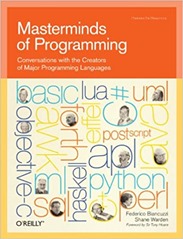 The next review in my work related books thread is of Masterminds of Programming by Federico Biancuzzi and Shane Warden. The subtitle, Conversations with the creators of major programming languages, is a good summary of the contents. The book is an edited transcript of interviews with the creators of major programming languages.
The next review in my work related books thread is of Masterminds of Programming by Federico Biancuzzi and Shane Warden. The subtitle, Conversations with the creators of major programming languages, is a good summary of the contents. The book is an edited transcript of interviews with the creators of major programming languages.
Frequently the conversation is with a single person but in a couple of cases two or even three people are interviewed. This is one small failing of the book because particularly where they interview three people the resulting chapter is very long and a bit repetitive.
There is a valid question to ask as to whether languages can be so closely tied to single individuals, and in the afterword the authors touch on this saying that one of the recurring themes was that the people they interviewed succeeded because they surrounded themselves with brilliant people. Some of these languages started off as one-man exercises but most grow from collective academic or corporate efforts, and even the one-man band languages developed a fairly formal community.
The languages covered are object-oriented languages (C++, Objective-C, Java, C# and Eiffel), functional languages (ML, Haskell, APL), glue languages originally designed to occupy the space between Unix and C (Awk, Lua, Python, Perl), languages designed for embedding (Forth and PostScript). Dartmouth Basic, SQL and UML are basically their own things. To be honest UML does not really fit into the book in my view since it is a formal design description language rather than an executable programming language. The languages were created between 1964 (Dartmouth BASIC) or maybe 1957 (for APL) and 2000 (C#).
I was sad to note the absence of a chapter on FORTRAN but John Backus, the inventor of FORTRAN died in 2007 – a couple of years before the book was written. Also there are no women interviewed in this book, a quick search reveals there are a number of programming languages invented or co-invented by women. COBOL, invented by Grace Hopper would be a prime candidate here but she died in 1992. Small Talk which inspired a lot of object-oriented languages was co-invented by Adele Goldberg and LOGO co-invented by Cynthia Solomon would fit rather well into the book.
The interviewers clearly had a set of questions which they asked each interviewee and the varying results indicate which questions chimed with the interests of the interviewee. The topics included concurrency, how to manage feature requests for languages, working in teams, debugging, software engineering and teaching.
The authors of the object-oriented languages (C++, Objective-C, Java, C# and Eiffel) are somewhat at each others throats. However, they are all pretty clear that object-orientation is the way forward for large software projects although they see encapsulation rather than inheritance or reuse as the key benefits it brings. There is a degree of condescension towards those languages that they perceived to have been successful as a result of marketing.
The authors of the functional programming languages are more interested in formal specification, I feel I should learn more about type theory. I have looked at Haskell in the past, and found it a bit challenging, however ideas from Haskell and other functional programming languages have made it into Python, my preferred language. The chapter on APL was entertaining, it was conceived and developed as a coherent formalised system for describing algebra the authors did not touch a computer for a number of years after “development” started in the mid-fifties. It is written as symbols which are challenging to enter on a conventional keyboard, you can see it in action here.
Tedd Codd’s relational database design was core to the success of SQL, and is largely why it has not been replaced. SQL was designed alongside IBM’s System R but Oracle produced the first commercial SQL engine.
I learnt a few random facts from the book which I can’t write as a coherent story:
- Charles H. Moore – author of Forth: “Legacy code may be the downfall of our civilisation”;
- Awk is an acronym of its authors names, Alfred Aho, Peter Weinberger and Brian Kernighan;
- Tom Love – co-author of Objective-C – “100,000 lines of code fills a box of paper and requires 2 people to maintain it. Test cases should be another two or three boxes.”!
The book would have really benefited from some sample code in each language, perhaps in the manner of Exercises in Programming Style which implements the same algorithm in different programming styles. I picked up Beautiful Code by Andy Oram and Greg Wilson, interviews with programmers, for my reading list. As well as The Mythical Man-month by Frederick P. Brooks, Jr which I probably should have read years ago.
I found this book really interesting, in part as a way of understanding how the programming languages I use every day of my working life came into being but also to understand the mindset of highly skilled programmers.

